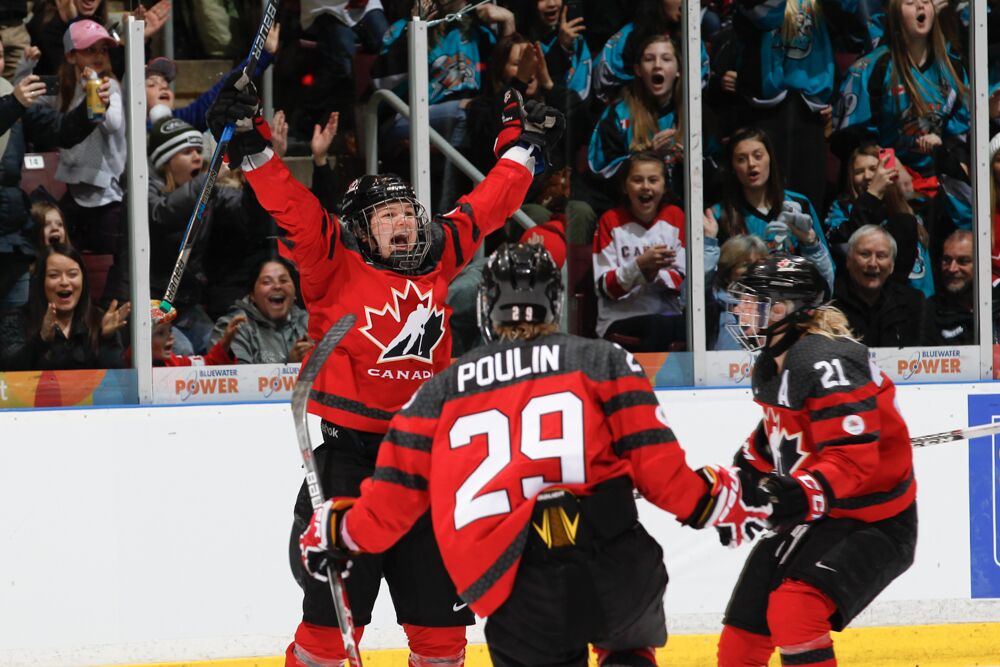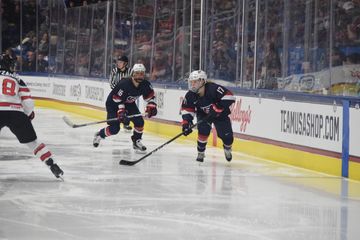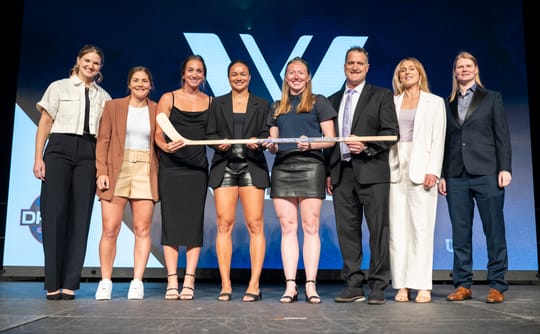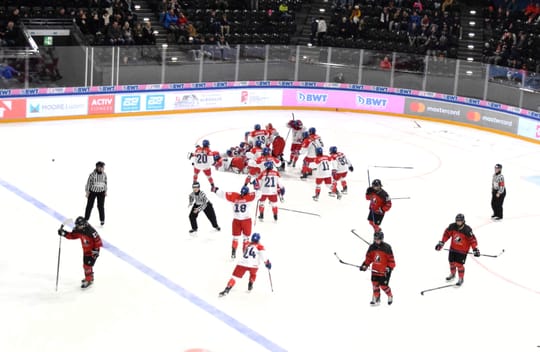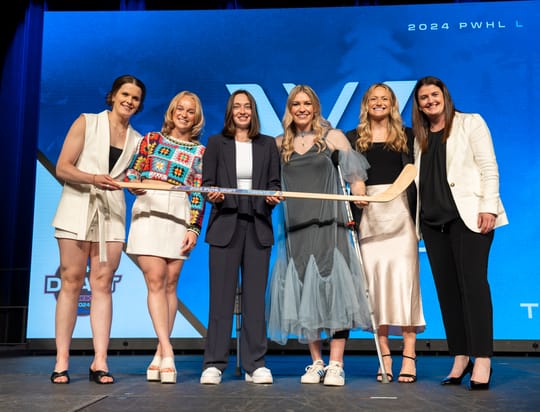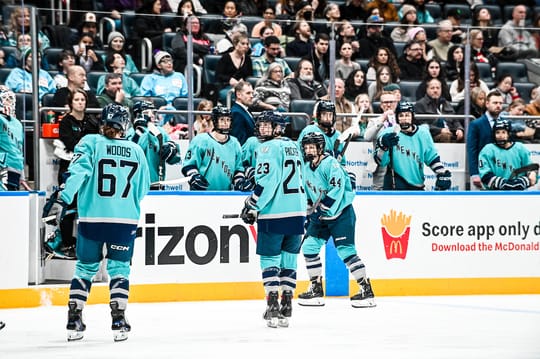(Photo credit: Hockey Canada/Twitter)
Over forty-five of the top women's hockey players from the United States and Canada participated in the first-ever Winter Series, which featured a pair of exhibition games between the US and Canada on December 17 and 19. The first game was held in Plymouth, Michigan and the second in Sarnia, Ontario.
Canada swept the series, capturing the first game by a score of 5-3 thanks to four unanswered goals, including three in the final frame. They went on to win the second game just 52 seconds into overtime, thanks to a shot by Marie-Philip Poulin.
In game one, Rebecca Johnston opened the scoring for Canada just 6:37 into the first period with a power-play tally. Less than five minutes later, the United States tied the game on a Hilary Knight power-play goal, followed by a Brianna Decker power-play goal later in the period.
Decker added her second of the night just 5:20 into the second period, and the United States held tight to a 3-1 lead. Canada's Jillian Saulnier made it a one-goal game less than halfway through the second period.
The third period was all Canada. Rebecca Johnston tied the game just 1:02 into the third, with Natalie Spooner putting her team up just 58 seconds later. Johnston completed the hat trick with an empty-netter with 32 seconds to play, and Canada skated off with the victory.
The United States outshot Canada by a 37-22 margin, but many of their struggles came on the power play. Though they did snag a pair of power-play goals in the first period, the team overall went just 2-for-10 throughout the game.
The Canadian win wasn't without sacrifice, however. Goaltender Ann-Renée Desbiens was helped off the ice following a non-contact injury just 8:55 into Friday's game. Shannon Szabados, who has found a home with Fort Saskatchewan of the CHL this season, came in to relieve her and stopped 16 of 19 shots faced in 51:05.
Hockey Canada later announced that Desbiens was done for the series, and brought in Calgary Inferno netminder Emerance Maschmeyer to fill in her place for the second game of the series.
Maschmeyer would act as a backup to Szabados in the second game of the tournament, which was a 3-2 overtime win for Canada.
As in the first game, Canada took an early lead, once again thanks to Rebecca Johnston. The US tied it just under 12 minutes later, and overall, the first period was an even one, with the shots at 7 per side.
The Americans played a strong second period, outshooting Canada by a 13-1 margin. Hilary Knight scored her first of the series to give the US a 2-1 lead heading into the third period. Though the US held onto that lead for much of the third, Canada rallied back at the very end to tie it up.
After pulling goaltender Szabados for the extra attacker, Canada tied the game thanks to a goal by Jennifer Wakefield with under thirty seconds to play. Just like that, it was anyone's game as the teams headed for overtime.
Just 52 seconds into the extra frame, Poulin -- who else, of course? -- scored a five-hole goal to give Canada the victory.
The Canadian Women's Hockey League and National Women's Hockey League were both well-represented in the series, with 12 CWHL players and 13 NWHL players participating.
The rosters included many of the biggest names in women's hockey: Hilary Knight, Marie-Philip Poulin, Megan Bozek, and Natalie Spooner, among others. The Minnesota Whitecaps were also well-represented, with seven players on the American team, including both goaltenders Nicole Hensley and Alex Rigsby.
As an aside, I'd be remiss if I failed to mention the broadcast coverage of the series. While the first game was covered on NBCSN in the United States, fans hoping to catch the second game had to go to HockeyTV.com. There, they were "treated" to several broadcasters who demonstrated a complete lack of knowledge of, or respect for, women's hockey.
Time and time again, these broadcasters mispronounced players' names, including those of Duggan and Poulin. They called Jocelyn Lamoreaux "Jocelyn Lemieux," referred to several players only by their numbers, and made other derogatory comments throughout the broadcast.
At one point, Paul Nathan, one of the broadcasters, said: "Women turning pro -- I just don't see it happening," completely disregarding the fact that there are already two women's professional leagues in North America.
The coverage was disappointing at best and represented attitudes that set women's hockey back, not help to grow the game -- and we can only hope that going forward, more suitable broadcasters will be used.
The first game that was broadcast on NBCSN saw some cross-promotion with the Twitter account @NHLonNBCSports, including .gifs of in-game action. The color commentary was provided by former US national team player A. J. Mleczko. Overall, the NBCSN broadcast utilized the chance to put women's hockey in the spotlight in a way that was exciting and fun.
Wraparound goal gives @HC_Women a 4-3 lead! #WCS2016 pic.twitter.com/KbWeXy5uBB
— NHL on NBC (@NHLonNBCSports) December 17, 2016
The Winter Series was an interesting look at how the teams are shaking out, still over a year away from Pyeongchang. We will provide some other thoughts on each team's performance later this week.
